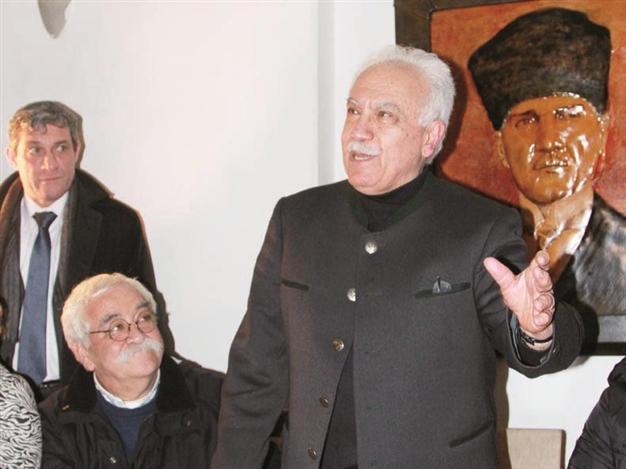Ergenekon coup plot releases last straw in judiciary rift
ANKARA

Workers’ Party chairman Doğu Perinçek addresses the media after being released from prison in the
Ergenekon coup plot case. AA photo
March 10 court ruling for the release of some key figures convicted of plotting a coup has further exposed a deepening rift between Turkey’s judicial mechanism and its elected government.
Those released included journalists, lawyers, retired military officers, a suspected gang leader and the killer of a top court judge.
The releases, which continued yesterday, were made possible with the change in the country’s anti-terrorism laws, which reduced the maximum pre-trial detention period from 10 years to five years. The lawyers applied to the Istanbul 21th High Criminal Court for the releases, instead of the Istanbul 13th High Criminal Court, after Parliament recently abolished the specially authorized courts.
The Istanbul 13th Heavy Penal Court, which handled the Ergenekon trial, rejected this decision, suggesting Parliament did not have the authority to abolish the special courts and adding that an application to the Constitutional Court had been filed for the annulation of the legal arrangement. It also claimed, as the court that dealt with the case, that it still maintained authority on deciding about the detentions of the convicts. Meanwhile, the Supreme Council of Judges and Prosecutors (HSYK) slammed the Istanbul 13th Criminal Court for “extorting authority.”
Minister weighs in
The 3rd Chamber decided on March 11 to launch an examination about the president and members of the Istanbul 13th Heavy Penal Court, a former specially authorized court, which ruled that the continued detention of some Ergenekon coup plot suspects was in line with Turkish legislation despite the fact that the appeal process was continuing.
The decision for examination was made by a majority vote on the grounds that the president and the members of court “have still not drafted the legal cause for their ruling concerning the Ergenekon case.”
The 3rd Chamber’s decision for examination needs to be approved by Justice Minister Bekir Bozdağ.
During the same hours when the 3rd Chamber’s decision was announced, the Justice Ministry released a statement which sounded like an ultimatum.
The Istanbul 13th Heavy Penal Court, which has been recently revoked by a law which entered into force on March 6, has “neither the duty nor the authority for appealing to the Constitutional Court in regards to the law about abolishment of the specially authorized courts,” according to the Justice Ministry’s statement.
“It is obvious that there can be question of an authority of the court, which has been abolished by the Law No. 6526, on any issue other than drafting the lawful cause within the duration that has been stated,” the statement continued.
Justice Minister Bozdağ, speaking in his hometown in the Central Anatolian province of Yozgat, late on March 10, made clear that the Istanbul 13th Heavy Penal Court had attempted to use an authority which it no longer has.
“Additionally, I want to state that the duty of founding courts as well as abolishing them belongs to the Parliament. Designating courts’ trial methods, duties and authorities and the authority to make laws belongs to the Parliament as well,” Bozdağ said, calling the HSYK to its duty. “Whatever the legal operations are about these judges who don’t recognize the law, the statute and the Constitution, they should be launched by the HSYK.”
Ergenekon suspects involved in Dink caseAs of late March 10, some 19 people, who were among hundreds convicted in the Ergenekon case, which lay at the heart of Erdoğan’s drive to break the political power of Turkey’s military, were released by separate courts.
Journalists Tuncay Özkan, Merdan Yanardağ and Hikmet Çiçek; lawyer Kemal Kerincsiz, an ultra-nationalist best known for his efforts to bring charges against Armenian-Turkish journalist Hrant Dink who was assassinated in January 2007 and Nobel laureate novelist Orhan Pamuk and other writers for insulting “Turkishness”; and neo-nationalist leader of the Workers’ Party (İP) Doğu Perinçek were among those released.
Perinçek most recently made headlines in December. A Swiss court had fined Perinçek for having branded talk of an Armenian genocide “an international lie” during a 2007 lecture tour in Switzerland.
Gang leader Sedat Peker, retired Col. Levent Göktaş; Prof. Yalçın Küçük, retired generals Hasan Iğsız and Şener Eruygur, retired rear admiral Alaaddin Sevim and Lt. Mehmet Ali Çelebi were among those released.
